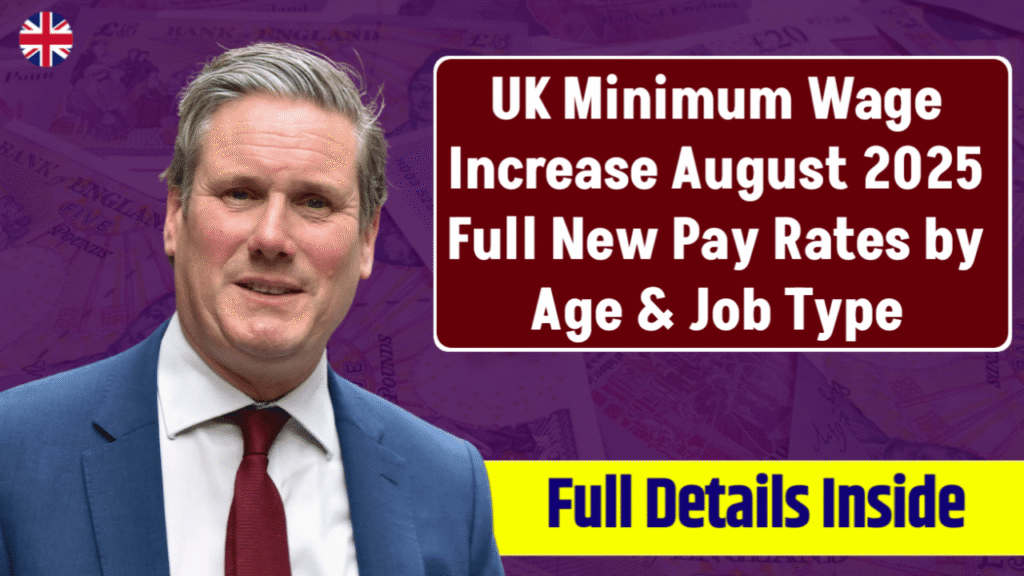The UK Government has confirmed a major increase to the minimum wage starting from August 2025, with new pay rates that will directly impact millions of workers across different age groups and job roles. Whether you work full-time, part-time, in hospitality, retail, or any other sector, it’s important to understand how these changes will affect your pay packet. This guide breaks down the updated wage rates, eligibility rules, and what both employees and employers need to know.
New Minimum Wage Rates From August 2025
From 1 August 2025, the National Minimum Wage (NMW) and National Living Wage (NLW) will see significant increases in line with inflation and economic growth forecasts. The rise aims to help workers cope with the higher cost of living and ongoing inflation pressures in the UK.
The updated rates will be applied according to age and whether you are an apprentice or a standard employee. For workers aged 21 and over, the National Living Wage will see the biggest jump, ensuring higher earnings per hour. Younger workers will also benefit, but their rates are slightly lower to reflect the standard progression structure.
Full Pay Breakdown by Age
The new pay structure is designed to ensure fair wages across different age brackets. For example:
- Workers aged 21 and over will see a notable increase that puts them closer to the real living wage benchmark.
- 18–20-year-olds will receive a higher boost compared to previous years, helping to narrow the gap between younger and older workers.
- Under-18 workers will also get a pay rise, which is especially important for those working part-time while studying.
- Apprentices will benefit from a new minimum that is more aligned with their skills and contributions.
Why The Wage Increase Matters
The decision to raise wages is not just about keeping up with inflation—it’s also about improving living standards. With rent, energy bills, and food prices continuing to rise in the UK, many low-paid workers have struggled to make ends meet. This increase aims to provide them with a better financial cushion and more disposable income.
It’s also expected to improve worker retention, as higher pay can reduce staff turnover, especially in industries like hospitality, care, and retail where recruitment has been challenging since the pandemic.
Impact on Different Job Sectors
The August 2025 wage hike will have different impacts depending on the industry. In hospitality, for example, the rise will mean higher payroll costs for employers, but also potentially better service quality as workers feel more valued. In retail, the changes could encourage staff to stay longer, reducing hiring and training expenses. For care sector workers, this could mean improved morale and possibly better patient care outcomes.
Employer Responsibilities
Employers will need to ensure they are fully compliant with the new rates from 1 August 2025. This means updating payroll systems, employment contracts, and ensuring staff are aware of the changes. Failing to pay the correct rate could result in penalties, legal action, and being named on the government’s list of non-compliant employers. Employers should also factor in the increased wage costs when planning budgets for the next financial year.
How To Check If You’re Paid Correctly
If you are a worker in the UK, you can check your payslip from September 2025 onwards to make sure you have been paid according to the new minimum wage rates. The GOV.UK website also offers an online calculator where you can enter your hourly rate and working hours to confirm compliance. If your employer is paying you less than the legal rate, you have the right to raise the issue directly or contact HMRC for investigation.
Apprentice Pay Changes
Apprentices often earn less than fully qualified workers, but the August 2025 increase will boost their minimum hourly rate. This change is intended to encourage more young people to take up apprenticeships and ensure they can afford basic living costs while training. Employers offering apprenticeship programmes will need to update their contracts to reflect this new pay structure.
Wage Increase and Inflation
While some critics argue that wage rises can lead to higher prices, economists point out that the August 2025 adjustment is designed to be in line with economic forecasts, aiming to boost consumer spending without causing excessive inflation. Higher wages generally mean more disposable income, which can stimulate local economies, particularly in towns and cities where a large proportion of the workforce earns close to the minimum wage.
Possible Effects on Working Hours
Some businesses may respond to higher wages by reducing staff hours to control costs, but this is not always the case. Many employers find that paying higher wages can lead to increased productivity, fewer sick days, and improved job satisfaction, which can actually balance out the higher payroll expenses. Workers should keep track of their contracted hours after the wage increase to ensure no unfair reductions occur.
How Students and Part-Time Workers Benefit
Students and part-time workers will also see higher take-home pay as a result of the wage changes. This can be particularly beneficial for those in seasonal jobs or working flexible hours around their studies. Even small increases in hourly rates can add up over weeks and months, providing more financial security during academic terms and holidays.
How To Claim Missing Pay
If you believe you have been underpaid after the August 2025 wage increase, you can first speak directly to your employer to resolve the issue. If that doesn’t work, contact Acas or submit a complaint to HMRC, who have the authority to investigate and order employers to repay missing wages. You may also be entitled to back pay for any underpayments made after the increase took effect.
The Bigger Picture
The August 2025 minimum wage increase is part of the UK Government’s long-term goal to ensure fair pay for all workers, regardless of age or job type. By boosting earnings across the board, the policy aims to reduce poverty, increase job satisfaction, and encourage more people to enter or stay in the workforce.
